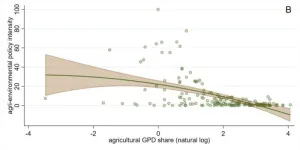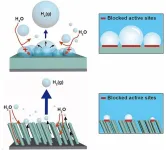(Press-News.org) There can be no analysis without data. In this spirit, researchers from the University of Bonn and the Swiss Federal Institution of Technology (ETH) Zurich have published a database containing over 6,000 agri-environmental policies, thus enabling their peers as well as policymakers and businesses to seek answers to all manner of different questions. The researchers have used two examples to demonstrate how this can be done: how a country’s economic development is linked to its adoption of agri-environmental policies and how such policies impact soil erosion. Their study has now been published in “Nature Food.” Embargo: Don´t publish before March 22, 2024, 11 AM CET!
Although agriculture is vital for our survival and well-being, it is also responsible for significant greenhouse gas emissions, biodiversity loss and soil degradation. Countries are therefore adopting all manner of different policies to make agriculture sustainable, from regulations to paying for agri-environmental services. Every year, new laws, programs, and schemes are introduced all over the world while others are abolished, making it hard to keep track of developments. This is a problem for researchers and policy decision-makers alike: how are they to go about making comparisons? How can they tell which measures work in which circumstances? Together with colleagues at ETH Zurich, Professor David Wuepper from the Institute for Food and Resource Economics at the University of Bonn has now put together an extensive, easy-to-use database containing 6,124 policies from over 200 countries that were adopted between 1960 and 2022.
In their work, the team focused on measures that meet certain criteria: “First and foremost, the measure has to be relevant in some way to agriculture, such as land use, nitrogen fertilizers or pesticides. But forest conservation is included too, because it’s linked to agriculture in many countries,” explains Wuepper, who is also a member of the PhenoRob Cluster of Excellence at the University of Bonn. The measures also have to have national significance, meaning that they cannot be focused too strongly on the local level, for example. New thematic areas can be added to the database at any time. “We deliberately gave it a modular structure so we can keep on expanding it.”
Old question meets new data
Wuepper and his co-authors were quick to use their database to shine new light on an old but contentious question: how does a country’s economic development tie in with its adoption of agri-environmental policies? “You might expect higher-income countries to implement a larger number of eco-friendly measures because the environment is becoming increasingly important in relative terms on the policy front,” Wuepper explains. And, thanks to his database, he has now been able to confirm that this is indeed the case. “We’ve shown that richer countries actually do introduce more measures, generally speaking.” Here too, however, it is the exceptions that prove the rule. “This trend doesn’t apply across the board. For instance, the Middle Eastern have relatively few agri-environmental policies in place given their income level. This demonstrates that countries need to make an active effort to implement sustainable policies and that it won’t happen by itself.” What these policies then actually achieve, however, is another question entirely. “But this is also something that can—and should—be investigated with the help of the database,” Wuepper says, and in fact an initial analysis of this kind is included in the article that has been published.
National policies help fight the problem of soil erosion
The database helped Wuepper answer a question that had been on his mind for some time: in a previous research project at ETH Zürich (https://www.nature.com/articles/s41893-019-0438-4), he had studied what impact countries have on soil erosion. “Comparing levels of soil erosion along national borders showed that countries exert significant influence,” Wuepper reveals. “At the time, we were able to demonstrate a link to agriculture, and we also thought that national policies might be an influencing factor. However, we couldn’t look into it because we didn’t have the data on the countries’ relevant policies to compare on a global scale.” Armed with their new policy database, the researchers have now been able to investigate the extent to which this significant influence that countries exert on global erosion can be explained by their policies. They have found that national soil management policies account for at least 43 percent of a country’s impact on soil erosion.
The database is accessible to the general public at https://zenodo.org/records/10842614
Institutions involved and funding secured
The University of Bonn and ETH Zurich were involved in the study, which was funded by the European Research Council and the PhenoRob Cluster of Excellence.
Although agriculture is vital for our survival and well-being, it is also responsible for significant greenhouse gas emissions, biodiversity loss and soil degradation. Countries are therefore adopting all manner of different policies to make agriculture sustainable, from regulations to paying for agri-environmental services. Every year, new laws, programs, and schemes are introduced all over the world while others are abolished, making it hard to keep track of developments. This is a problem for researchers and policy decision-makers alike: how are they to go about making comparisons? How can they tell which measures work in which circumstances? Together with colleagues at ETH Zurich, Professor David Wuepper from the Institute for Food and Resource Economics at the University of Bonn has now put together an extensive, easy-to-use database containing 6,124 policies from over 200 countries that were adopted between 1960 and 2022.
In their work, the team focused on measures that meet certain criteria: “First and foremost, the measure has to be relevant in some way to agriculture, such as land use, nitrogen fertilizers or pesticides. But forest conservation is included too, because it’s linked to agriculture in many countries,” explains Wuepper, who is also a member of the PhenoRob Cluster of Excellence at the University of Bonn. The measures also have to have national significance, meaning that they cannot be focused too strongly on the local level, for example. New thematic areas can be added to the database at any time. “We deliberately gave it a modular structure so we can keep on expanding it.”
Old question meets new data
Wuepper and his co-authors were quick to use their database to shine new light on an old but contentious question: how does a country’s economic development tie in with its adoption of agri-environmental policies? “You might expect higher-income countries to implement a larger number of eco-friendly measures because the environment is becoming increasingly important in relative terms on the policy front,” Wuepper explains. And, thanks to his database, he has now been able to confirm that this is indeed the case. “We’ve shown that richer countries actually do introduce more measures, generally speaking.” Here too, however, it is the exceptions that prove the rule. “This trend doesn’t apply across the board. For instance, the Middle Eastern have relatively few agri-environmental policies in place given their income level. This demonstrates that countries need to make an active effort to implement sustainable policies and that it won’t happen by itself.” What these policies then actually achieve, however, is another question entirely. “But this is also something that can—and should—be investigated with the help of the database,” Wuepper says, and in fact an initial analysis of this kind is included in the article that has been published.
National policies help fight the problem of soil erosion
The database helped Wuepper answer a question that had been on his mind for some time: in a previous research project at ETH Zürich (https://www.nature.com/articles/s41893-019-0438-4), he had studied what impact countries have on soil erosion. “Comparing levels of soil erosion along national borders showed that countries exert significant influence,” Wuepper reveals. “At the time, we were able to demonstrate a link to agriculture, and we also thought that national policies might be an influencing factor. However, we couldn’t look into it because we didn’t have the data on the countries’ relevant policies to compare on a global scale.” Armed with their new policy database, the researchers have now been able to investigate the extent to which this significant influence that countries exert on global erosion can be explained by their policies. They have found that national soil management policies account for at least 43 percent of a country’s impact on soil erosion.
The database is accessible to the general public at https://zenodo.org/records/10842614
Institutions involved and funding secured
The University of Bonn and ETH Zurich were involved in the study, which was funded by the European Research Council and the PhenoRob Cluster of Excellence.
END
All countries’ agri-environmental policies at a glance
University of Bonn researchers publish dataset of over 6,000 policies from all over the world
2024-03-22
ELSE PRESS RELEASES FROM THIS DATE:
Bees need food up to a month earlier than provided by recommended pollinator plants
2024-03-22
Embargoed until 08:00 AM GMT / 04:00 AM ET Friday 22 March 2024
Bees need food up to a month earlier than provided by recommended pollinator plants
Plant species which are recommended as ‘pollinator friendly’ in Europe begin flowering up to a month too late for bees, resulting in low colony survival and low production of queens.
This is the first time that research has quantified the decline in colony survival and queen production due to a shortage of early season food.
Enhancing ...
Discovery of a hidden quantum critical point in two-dimensional superconductors
2024-03-22
Weak fluctuations in superconductivity1, a precursor phenomenon to superconductivity, have been successfully detected by a research group of Tokyo Institute of Technology (Tokyo Tech). This breakthrough was achieved by measuring the thermoelectric effect2 in superconductors over a wide range of magnetic fields and over a wide range of temperatures from much higher than the superconducting transition temperature to very low temperatures near absolute zero. This revealed the full picture of fluctuations in superconductivity ...
Multi-cusped postcanine teeth are associated with zooplankton feeding in phocid seals.
2024-03-22
The morphology of an animal's teeth often reflects its diet. A well-known example of a mammal that feeds in the water is the crabeater seal (Lobodon carcinophaga), which consumes large amounts of zooplankton. Crabeater seals have complex, jagged teeth, which are believed to function as a sieve to retain krill in their mouths and filter it from seawater. Furthermore, recent studies have shown that the Baikal seal (Pusa sibirica) also preys on large quantities of zooplankton and possesses distinctive jagged teeth. Thus, while behavioral observations and tooth morphology studies suggest a ...
Outcomes after stem cell transplant in elderly patients with acute myeloid leukemia have improved since 2000
2024-03-22
Bottom Line: Among patients over 65 who received an allogeneic hematopoietic stem cell transplant (allo-HCT) for the treatment of acute myeloid leukemia (AML) between 2000 and 2021, leukemia-free and overall survival improved significantly over time.
Journal in Which the Study was Published: Clinical Cancer Research, a journal of the American Association for Cancer Research (AACR)
Author: Ali Bazarbachi, MD, PhD, senior author of the study and a professor at the American University of Beirut in Lebanon
Background: AML ...
Longer genes are linked to aging
2024-03-22
· Long genes have more potential sites for DNA damage
· Genes involved in brain loss during aging and linked to Alzheimer’s are very long
· New view of biological aging differs from previous beliefs
CHICAGO --- What causes our body to age? Four complementary studies, including one from Northwestern Medicine, have come to the same conclusion: long genes.
In a new paper, the scientists write about their findings and how they advance existing knowledge about aging.
“Long genes ...
Revolutionizing hydrogen production: Economical and efficient solutions unveiled
2024-03-22
Water eletrolysis process is a system that produces hydrogen by electrolyzing water. It is an eco-friendly technology that can produce hydrogen fuel, a future energy source, without emitting environmental pollutants, but its limitations have been pointed out as low hydrogen production efficiency and high production costs. Recently, a team of researchers from Pohang University of Science and Technology (POSTECH) published research that solved both problems at once, attracting attention.
A collaborative research team comprising Professor Jong Kyu Kim, Jaerim Kim, a Ph. D. candidate, Professor ...
James Webb Space Telescope captures the end of planet formation
2024-03-22
Scientists believe that planetary systems like our solar system contain more rocky objects than gas-rich ones. Around our sun, these include the inner planets – Mercury, Venus, Earth and Mars – the asteroid belt and the Kuiper belt objects such as Pluto.
Jupiter, Saturn, Uranus and Neptune, on the other hand, contain mostly gas. But scientists also have known for a long time that planet-forming disks start out with 100 times more mass in gas than solids, which leads to a pressing question: When ...
If faces look like demons, you could have this extraordinary condition
2024-03-22
Imagine if every time you saw a face, it appeared distorted. Well, for those who have a very rare condition known as prosopometamorphopsia (PMO), which causes facial features to appear distorted, that is reality.
As the Dartmouth-based website about prosopometamorphopsia explains, "'Prosopo' comes from the Greek word for face 'prosopon' while 'metamorphopsia' refers to perceptual distortions.''' Specific symptoms vary from case to case and can affect the shape, size, color, and position ...
Birmingham scientists win funding to develop “lollipops” for mouth cancer diagnosis
2024-03-22
VIDEO available to download HERE of scientist Ruchi Gupta explaining how she hopes to make a lollipop or lozenge to diagnose mouth cancer. The film features mouth cancer survivor Rachel Parsons and contains explicit images.
A ‘LOLLIPOP’ that can diagnose mouth cancer early could become a reality, thanks to a pioneering project funded by Cancer Research UK and the Engineering and Physical Sciences Research Council (EPSRC).
Dr Ruchi Gupta at the University of Birmingham has been awarded £350,000 over the next three years by Cancer Research UK and EPSRC to make a prototype flavoured ‘lollipop’ from a material called a smart hydrogel.
Smart ...
Reviving England’s polluted rivers? Incentivising farmers and comprehensive monitoring among key recommendations from experts
2024-03-22
At the close of 2023, Defra asked the British Ecological Society to bring together nearly 40 experts, to collate expert opinion on freshwater policy and set out a list of priorities for the biodiversity evidence programme to focus on. Published today, the new report sets out priorities for restoring England’s polluted fresh waters.
We know that England’s rivers, and the life they support, are in a desperate state. The River Trust’s annual State of Our Rivers report found that a mere 15% of rivers in England were classed as being in good ecological health and no ...
LAST 30 PRESS RELEASES:
Scientists discover why we know when to stop scratching an itch
A hidden reason inner ear cells die – and what it means for preventing hearing loss
Researchers discover how tuberculosis bacteria use a “stealth” mechanism to evade the immune system
New microscopy technique lets scientists see cells in unprecedented detail and color
Sometimes less is more: Scientists rethink how to pack medicine into tiny delivery capsules
Scientists build low-cost microscope to study living cells in zero gravity
The Biophysical Journal names Denis V. Titov the 2025 Paper of the Year-Early Career Investigator awardee
Scientists show how your body senses cold—and why menthol feels cool
Scientists deliver new molecule for getting DNA into cells
Study reveals insights about brain regions linked to OCD, informing potential treatments
Does ocean saltiness influence El Niño?
2026 Young Investigators: ONR celebrates new talent tackling warfighter challenges
Genetics help explain who gets the ‘telltale tingle’ from music, art and literature
Many Americans misunderstand medical aid in dying laws
Researchers publish landmark infectious disease study in ‘Science’
New NSF award supports innovative role-playing game approach to strengthening research security in academia
Kumar named to ACMA Emerging Leaders Program for 2026
AI language models could transform aquatic environmental risk assessment
New isotope tools reveal hidden pathways reshaping the global nitrogen cycle
Study reveals how antibiotic structure controls removal from water using biochar
Why chronic pain lasts longer in women: Immune cells offer clues
Toxic exposure creates epigenetic disease risk over 20 generations
More time spent on social media linked to steroid use intentions among boys and men
New study suggests a “kick it while it’s down” approach to cancer treatment could improve cure rates
Milken Institute, Ann Theodore Foundation launch new grant to support clinical trial for potential sarcoidosis treatment
New strategies boost effectiveness of CAR-NK therapy against cancer
Study: Adolescent cannabis use linked to doubling risk of psychotic and bipolar disorders
Invisible harms: drug-related deaths spike after hurricanes and tropical storms
Adolescent cannabis use and risk of psychotic, bipolar, depressive, and anxiety disorders
Anxiety, depression, and care barriers in adults with intellectual and developmental disabilities
[Press-News.org] All countries’ agri-environmental policies at a glanceUniversity of Bonn researchers publish dataset of over 6,000 policies from all over the world







